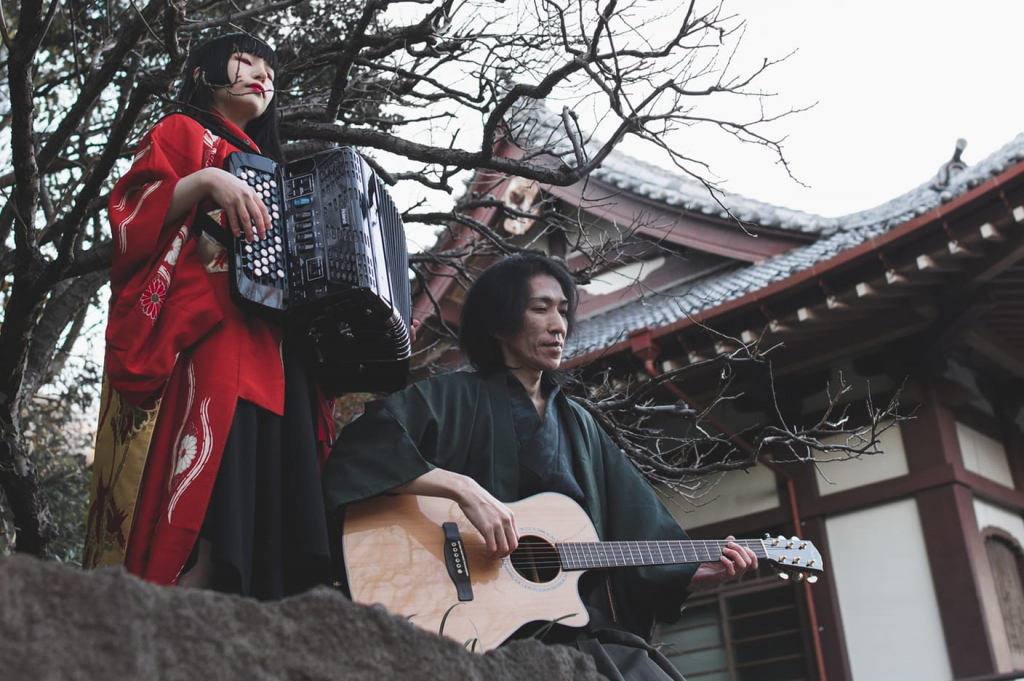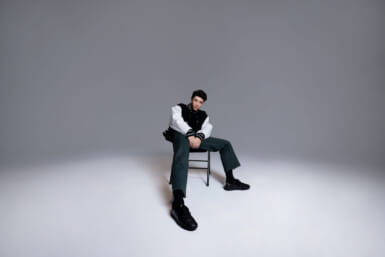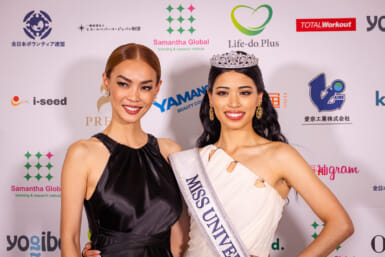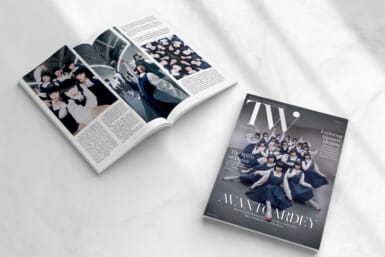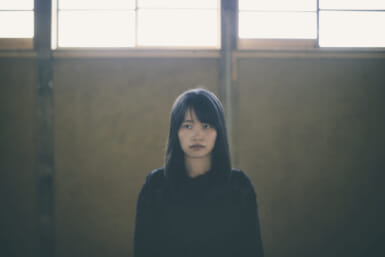Tokyo Weekender and More Than Music collaborate in a monthly interview series with the diverse musical performers on the Tokyo music scene. For this interview, we caught up with TOW. Don’t miss out on their live performance at TW’s May-June 2022 issue party on June 3 in Daikanyama.
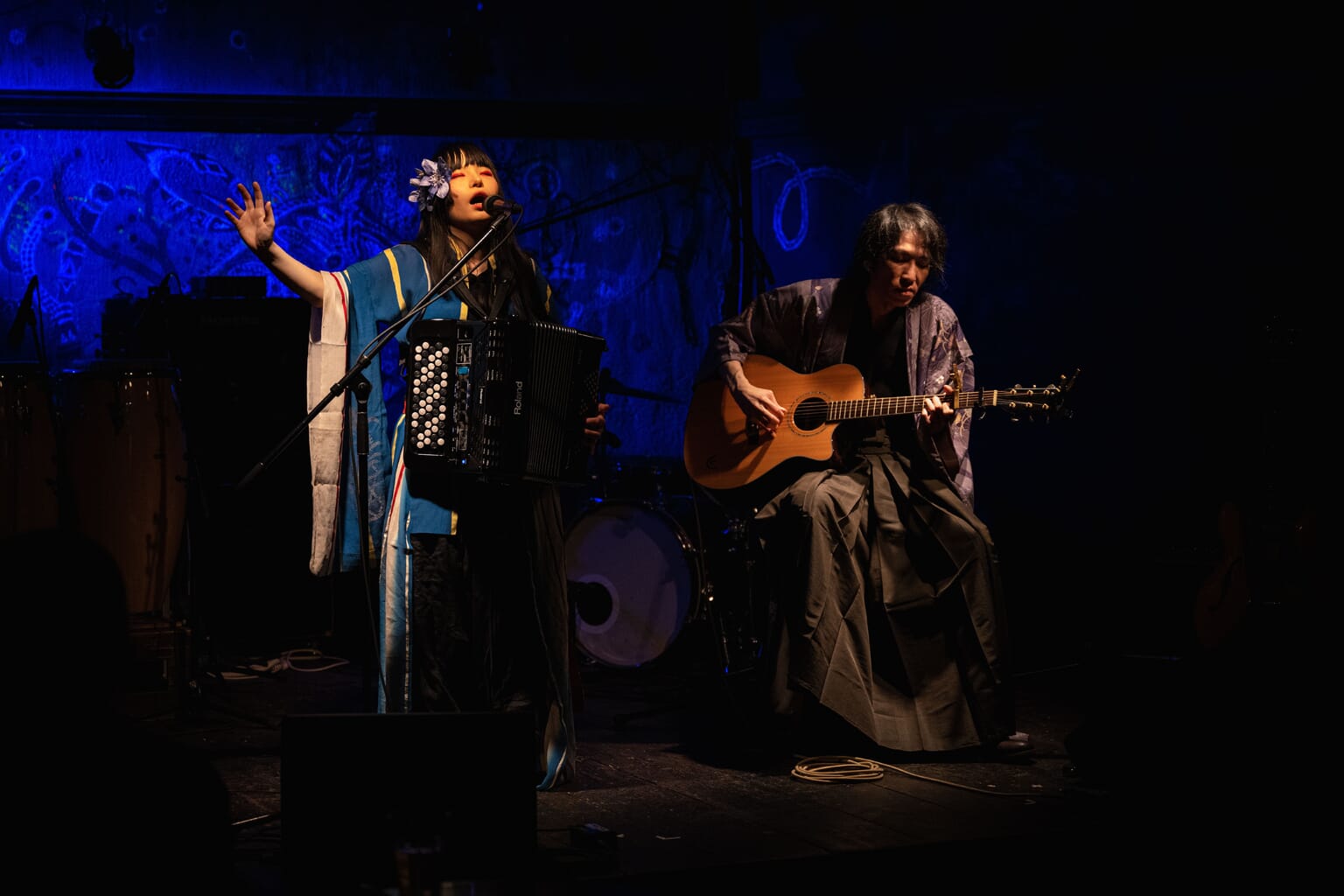
Photo by Brendan McKenna
Tow (stylized as TOW) is a Japanese acoustic band. Nue sings and plays the electric accordion while Kai plays the acoustic guitar. Their songs have that classic Japanese feel to them. Tow shine in live performances, sometimes collaborating with other artists on stage including a live calligraphy show.
How would you describe your music in one word or phrase?
Nue: A certain world.
Can you tell us more about the backstory behind the name Tow?
N: Originally, it was “tou,” a sound that suddenly popped into my imagination. (Tow is read as “you” in Japanese). The “you” sound can have many meanings such as “ask,” “answer,” or “tower.” We had also discussed the idea of having “two” as the name, to represent the pair of us and duality. We chose “Tow” as an anagram of “two” and “tow,” meaning “to pull” in English. We hope that the sound will lead listeners to new discoveries.
What does a typical day look like for you?
Kai: I don’t have much of an on or off mindset where music is my job and the rest of my time is off. I often spend time connected to some activity even when I am not playing music, for example, watching a movie, playing a game, taking a walk, etc.
N: I really want to sleep 16 hours a day like a cat. I spend my mornings slowly and in the evening, I become active and start writing songs, working and doing daily chores. When I have time, I often enjoy playing games and creating videos late at night.

Photo by Wahei Nakamura
What is your music creation process like?
K: The two of us build a song based on the worldview we associate with a short phrase that one of us plays. In the end, Nue often adds the lyrics. There are many cases in which a song is assembled to completion by one person and sometimes a song is created while associating sounds with a part of the lyrics, so there is no one set process. No matter what the process is, I imagine some scenery or emotion and then I convert it into sound, so the arrangement is also built around the image.
What are your studio recordings and live performances like?
K: Basically, our music is often created for live performances, but these are not songs that are played according to the score. Except for the core part of the song, we improvise according to our emotions at the time and never play a song exactly the same way. On the other hand, studio recordings are often recorded after the song is reworked into a score, so the impression may be very different from that of a live performance. In recordings, we also play instruments that we never use in our live performances. We try to build the world of the song with an approach that is unique to the recording.
N: Our performances are often described with the word “worldview,” but it may be more like a “temporary dream” or a “trip to an otherworldly scene.”
What was your most unforgettable live performance?
K: Every live performance has been memorable, but the first time we performed at More Than Music was unforgettable. Until then, we had mostly performed in front of Japanese audiences. Many of them listened to our performances quietly or approached me discreetly. Of course, we were happy to receive such reactions, but when we performed at MTM for the first time, we received direct reactions from many people at the event. I was very impressed and happy that we were able to directly feel that our performance was enjoyed so much.
Are there any artists you take musical inspiration from?
N: I often get inspiration from the traditional music of various countries. I also try to incorporate Japanese classical court music and other pre-Edo Period music.
K: Rather than specific artists or genres, I am inspired by music that is strongly associated with scenery and emotion, including not only whole songs but also partial phrases. To name a specific example, music by Joe Hisaishi, who was in charge of Ghibli’s music.

Photo by Wahei Nakamura
What would you be doing if you weren’t making music?
N: I think I would be living with cats and being cat-centric.
K: For me, music is an important way of life, or “Ikisama” in Japanese. It’s an indispensable part of my life and it’s difficult for me to imagine any other way of life. I love creating, so maybe I would be creating other art.
Dream guest artist, dead or alive to have a meal and drink with?
N: There are so many that I can’t pick one. It would be fun to have a dinner party with people from all over the world who are involved in the culture every 50 years of human history.
K: I’d like to meet great musicians such as Beethoven and Mozart. Outside of classical music, I would like to talk with artists such as Bjork, whose worldview is outstanding.
Check out TOW on Instagram.
You can see TOW perform live on Friday, June 3 at TW’s May-June 2022 issue party in Daikanyama.
TW readers get a 10% discount on the ticket by entering the code: TKYWD at check-out.
The same code gets you a 50% discount on the first month of the membership fee as a trial. You can sign up for membership here.
Updated On February 8, 2023

